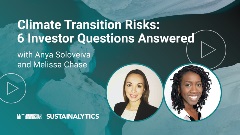Landmark Rules Ask Companies to Grapple With Climate Risk Very Publicly
Ron Bundy hosts an interview with Gabriel Presler, Global Head of Enterprise Sustainability at Morningstar and Aron Szapiro, Morningstar’s Head of Retirement Studies and Public Policy, to discuss what the new SEC rule and other climate regulations mean.
Six Best Practices Followed by Industries Leading the Low Carbon Transition
In this article, we take a closer look at the leading industries under the Morningstar Sustainalytics Low Carbon Transition Rating (LCTR) and examine the best practices that have allowed them to emerge as leaders in managing their climate risk.
Beyond 1.5 Degrees: What the LCTR Tells Us About Companies Managing Their Climate Risk
The LCTR rating of over 8,000 companies shows that global temperatures will rise 3.1 degrees Celsius over pre-industrial averages. This article looks at the overall performance of these companies and the industries that are leading on climate.
The SEC’s Climate Disclosure Rule: A Step in the Right Direction
The U.S. Securities and Exchange Commission (SEC) recently published the final version of its long-awaited Climate Disclosure Rule. The final rule differs significantly from its original draft and further departs from other standards about to be implemented around the globe.
Climate Transition Risk: 6 Investor Questions Answered
This video interview provides insight into the challenges institutional investors face as they struggle to comply with the growing slate of climate-related reporting frameworks and standards, while trying to identify, manage and mitigate climate transition risks in their portfolios.
Constructing Zero Deforestation Portfolios to Combat Climate Change and Biodiversity Loss
The world’s forests are under threat, putting ecosystem services and global economic wealth in danger. But investors can help to fight deforestation. In this article, learn the reasons why investors should pursue zero deforestation portfolios.
ESG in Conversation: ISSB Sets New Standards for Sustainability Reporting
In this episode, learn about the upcoming greenhouse gas reporting requirements for North American companies, EU's Fit for 55 package and the implication for companies in the region, and what the newly published ISSB standards mean for companies and investors.
The Raw Materials Crunch: Industry Risks Due to Physical Scarcity, Supply Concentration and Intense Demand
As demand for critical raw materials increases, due in part to the low-carbon transition, industries reliant on those materials face growing risks. In this article, discover what’s driving those risks.
Mandatory Scope 3 Emissions Reporting in the U.S. and Canada: Most Companies Are Unprepared
Learn just how prepared U.S. and Canadian companies are for the proposed scope 3 emissions disclosure rules and how investors can leverage engagement to help companies meet the various challenges of GHG emissions reporting.
Policy Responses to Climate Change: The EU’s Fit for 55 Package and Its Implications for Companies and Investors
Governments need to be more decisive to slow global temperature rise. The EU’s Fit for 55 package, with its ambitious targets for energy-intensive sectors, is an example of the required policy response needed to decarbonize global economies.
















